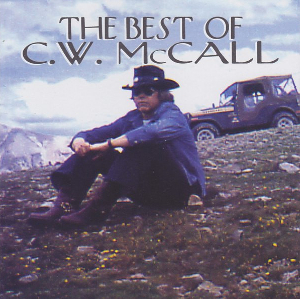Louis F. "Chip" Davis Jr. is the founder and leader of the music group Mannheim Steamroller, and has also written and made other albums such as Day Parts and written several books.
Mannheim Steamroller is an American neoclassical new-age music group founded by Chip Davis that is known primarily for its Fresh Aire series of albums, which blend classical music with elements of new age and rock, and for its modern recordings of Christmas music. The group has sold 28 million albums in the U.S. alone.
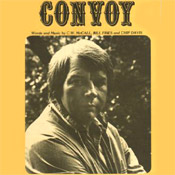
"Convoy" is a 1975 novelty song performed by C. W. McCall that became a number-one song on both the country and pop charts in the US and is listed 98th among Rolling Stone magazine's 100 Greatest Country Songs of All Time. Written by McCall and Chip Davis, the song spent six weeks at number one on the country charts and one week at number one on the pop charts. The song went to number one in Canada as well, hitting the top of the RPM Top Singles Chart on January 24, 1976. "Convoy" also peaked at number two in the UK. The song capitalized on the fad for citizens band (CB) radio. The song was the inspiration for the 1978 Sam Peckinpah film Convoy.
"'Round the World with the Rubber Duck" is the 1976 novelty song performed by C.W. McCall that was the sequel to the similar truck-driving country hit, "Convoy". "'Round the World with the Rubber Duck"

Wolf Creek Pass is an album by country musician C. W. McCall, released in 1975 on MGM Records. It was recorded after the success of a song included in the album, "Old Home Filler-up an' Keep on a-Truckin' Cafe", which was used in a popular television commercial that helped make McCall famous. McCall himself was the pseudonym of Bill Fries and was convened by Fries along with Chip Davis of Mannheim Steamroller fame. The album concentrated predominantly on themes related to trucking, with many of them based on events in Fries' life. The album also contained the eponymous song "Wolf Creek Pass", which helped popularize the actual mountain pass itself. The actual "Old Home Filler-up an' Keep on a-Truckin' Cafe" was located in Pisgah, Iowa.

Black Bear Road is an album by country musician C. W. McCall, released on MGM Records in 1975. It is largely considered the album which gave him the most significant boost of his career, almost entirely due to the hit novelty song, "Convoy", that hit the number one spot on both Billboard's Country charts and its Pop charts. The song itself was largely responsible for starting a nationwide citizens' band radio craze. The song "Black Bear Road" in turn popularized the now-infamous road itself, along with its "You don't HAVE to be crazy to drive this road - but it helps" sign.
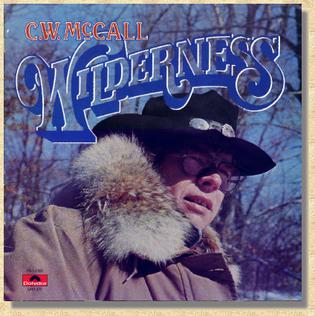
Wilderness is an album by country musician C. W. McCall, released on Polydor Records in 1976. As its title suggests, it focuses on subjects connected with nature, the environment and humans' impact on them. "There Won't Be No Country Music ", for example, is a statement on the environment's bleak-looking future and the effects of over-commercialization bordering on propaganda. "Crispy Critters", on the other hand, is the humorous telling of a true tale involving a group of hippies riding into a town and being forced away and threatened by the mayor.
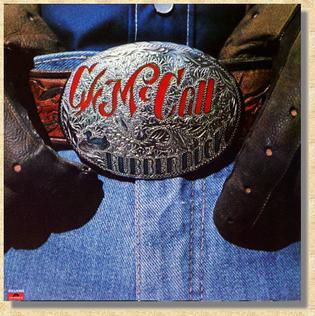
Rubber Duck is an album by country musician C. W. McCall, released on Polydor Records in 1976. It is his fourth album, released the same year as Wilderness, but concentrating on the themes the McCall character was popular for – trucking, as opposed to the various depictions of nature that could be found in Wilderness. Among others, the album contains the song "'Round the World with the Rubber Duck", a sequel to McCall's earlier wildly popular hit "Convoy", with many humorous and absurd elements added. "Audubon" is a quasi-autobiographical song, while "Ratchetjaw" is a take on trucker slang, with a multitude of CB-related terminology included in the lyrics.
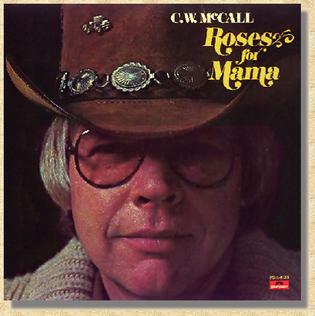
Roses for Mama is the fifth album by country musician C. W. McCall, released on Polydor Records in 1977. The album saw McCall singing several songs that were written by others, as opposed to his previous albums, which were written entirely by him and Chip Davis. In fact, only three songs were written by the McCall and Davis; these are "I Don't Know ", "The Gallopin' Goose" and "Old Glory". "The Battle of New Orleans" is a cover version of Johnny Horton's popular 1959 song.

The Real McCall: An American Storyteller is an album by country musician C. W. McCall, released on American Gramaphone in 1990 and rereleased in 1999. It features revamped digital versions of some of McCall's better known songs, including "Convoy", "Wolf Creek Pass" and "Black Bear Road", rerecorded by the artist for the album. It contains more songs than any other release by the artist, with sixteen tracks in total. It features songs from most of McCall's albums, the exceptions being his later works, C. W. McCall & Co. and Roses for Mama. One new track, "Comin' Back for More", telling the story of the infamous American cannibal Alferd Packer, was recorded for the album and serves as its opener.

American Spirit is an album released on American Gramaphone in 2003 as a collaboration between Mannheim Steamroller and country musician C. W. McCall. The album focuses on American patriotic songs, hence the title. McCall contributed to a number of spoken word songs on the album and rerecorded his 1976 hit song "Convoy" for it; this was also the case with another song of his, "Wolf Creek Pass," which can be found on the album.

C. W. McCall's Greatest Hits, as the title suggests, is a greatest hits compilation of country musician C. W. McCall's work, released in 1983 on Polydor Records, rereleased on September 21, 1993 and containing songs from the first five out of his six albums of original music, including the ever-popular "Convoy" and its sequel, "'Round the World with the Rubber Duck".
The Legendary C. W. McCall is a greatest hits album released on audio cassette only by country musician C. W. McCall in 1991, on the PolyGram label. It does not contain any songs that cannot be found on the most well-known "best of" releases from McCall, The Best of C. W. McCall and C. W. McCall's Greatest Hits. Several errors were made in the track listing; for instance, "Black Bear Road" was listed as "Black Beer Road", while "Crispy Critters" was given the title "Crispy Critter".
Four Wheel Cowboy is a greatest hits album by country musician C. W. McCall, released in 1989 on Polydor Records. All of the songs found on it, as well as three more, can be found on a later "best of" album, The Best of C. W. McCall. The release itself takes its name from a McCall song by the same name, which is featured on the album.

C. W. McCall & Co. is country musician C. W. McCall's sixth and last album of original songs, released on Polydor Records in 1979, before McCall announced his retirement from the music industry. Out of the ten tracks, only one was written as a collaboration between McCall and Chip Davis, the man responsible for popularizing the distinctive McCall persona, while one other, "Silver Cloud Breakdown", was composed by Davis several years earlier and was featured in the movie Convoy, though it was not present on its soundtrack.

This Time Around is the fourth studio album by Canadian country music singer Paul Brandt, released on Orange Music Canada, a subsidiary of Universal Music Group, in 2004. The record features a guest appearance by Keith Urban, who plays guitar on "Leavin'." This song was later released by Blaine Larsen in 2010. The album also features a remake of the C. W. McCall song "Convoy". It was recorded at The Orchard Studio near Nashville, TN and produced by Steve Rosen and Paul Brandt.

The Road Hammers is a Canadian country rock group composed of Jason McCoy, Clayton Bellamy and Chris Byrne. Formed by McCoy as a side project, the trio's music is influenced by 1960s and 1970s trucker music and Southern rock. Their first self-titled album included remakes of several classic truck-driving songs. It was recognized with a Juno Award in 2006, along with numerous Canadian Country Music Association awards. After five years together, the group went on hiatus after one last show on December 31, 2010 in Langley, British Columbia.The group reformed in 2013 and released Wheels in 2014. In May 2017, The Road Hammers released their latest album, The Squeeze.
Music in Omaha has been a diverse and important influence in the culture of the city. Long a home to jazz, blues, funk and rock, today Omaha has dozens of subgenres represented, including Latin, alternative rock and hip hop. Omaha's historical music contributions include being the home of a thriving African American music scene from the 1920s. More recently, it is home to indie rock's "Omaha Sound" and the birthplace of one of pop music's most successful producers, Terry Lewis.
"Six Days on the Road" is an American song written by Earl Green and Muscle Shoals Sound Studio songwriter Carl Montgomery, made famous by country music singer Dave Dudley. The song was initially recorded by Paul Davis and was released in 1961 on the Bulletin label. In 1963, the song became a major hit when released by Dave Dudley, peaking at #2 on the Billboard Hot Country Songs chart and cracking the Top 40 (#32) on the Hot 100, leading to it being hailed as the definitive celebration of the American truck driver.
